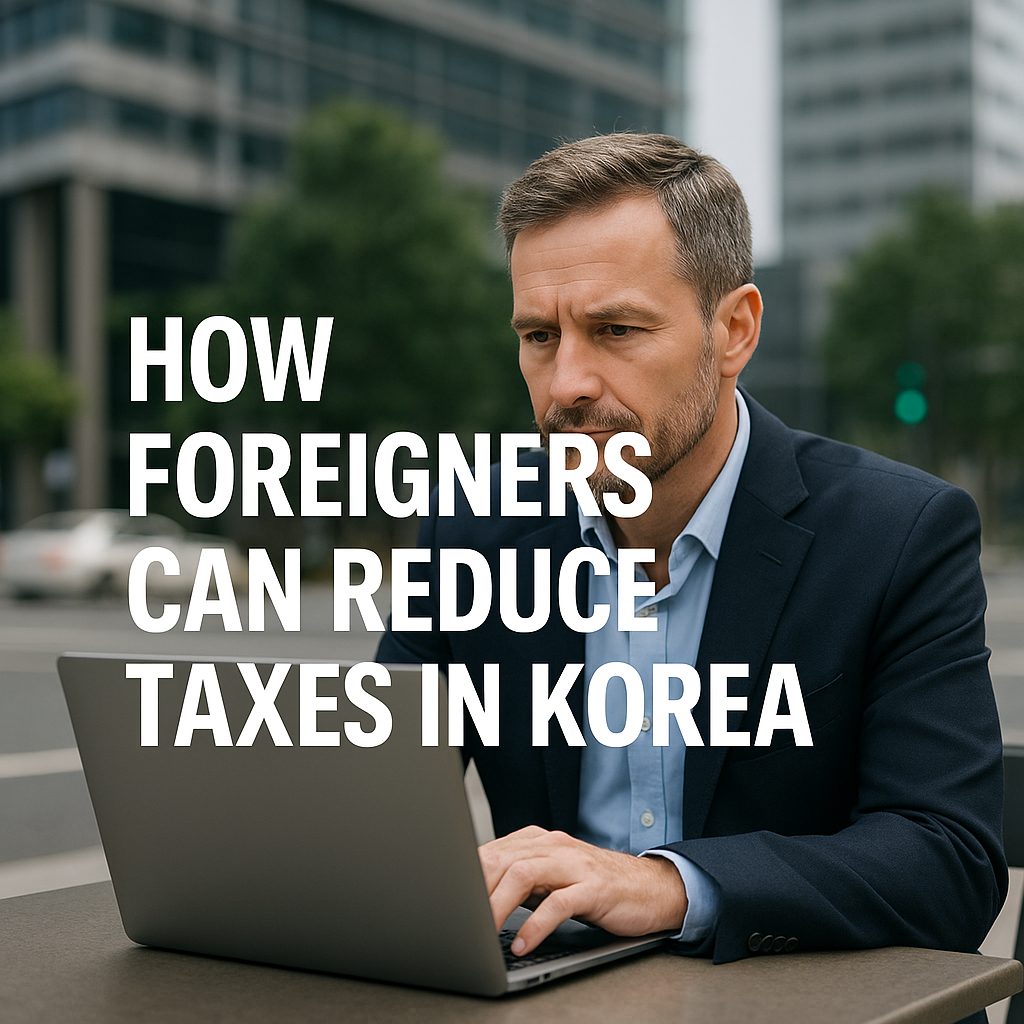Introduction
If you’re a foreigner living in South Korea—whether as a student, expat worker, remote freelancer, or long-term traveler—you may be overpaying your taxes without realizing it. Korea’s tax system can be confusing, especially if you don’t speak the language or understand your residency status. But here’s the good news: you don’t have to be a tax expert to save hundreds or even thousands of dollars per year. This guide shows you the most practical, legal, and updated ways to reduce your tax burden in 2025—no matter your visa type.
1. Understand Your Tax Residency Status First
The Korean National Tax Service (NTS) determines your tax obligations based on how long you stay in Korea and where your income is generated. There are two key categories:
- Resident: You’ve stayed in Korea more than 183 days in a year and have “center of life” in Korea
- Non-resident: You stay less than 183 days or do not have your main life and income based in Korea
▶ Why this matters:
- Residents are taxed on worldwide income
- Non-residents are taxed only on Korean-sourced income
Tip: If you’re a digital nomad working for overseas clients, maintaining non-resident status could dramatically reduce your tax liability.
2. Use the Korea-U.S. Tax Treaty (or Other Bilateral Agreements)
Korea has tax treaties with over 90 countries, including the United States, UK, Canada, and Australia. These treaties prevent double taxation, meaning you might not have to pay taxes in both Korea and your home country.
Key benefits of the treaty:
- Lower or zero withholding tax on dividends, royalties, and service fees
- Credit for taxes paid abroad
- In some cases, full exemption from Korean income tax (up to 2 years for U.S. professors, researchers, etc.)
How to use it:
- Download Form 2 (Application of Tax Treaty) from NTS
- Submit it with your Certificate of Tax Residency from your home country
- File this with your employer or income source in Korea
3. Deduct Allowable Expenses as a Freelancer or Business Owner
If you’re self-employed or registered as a business in Korea (even as a foreigner), you can deduct business-related expenses:
- Coworking space fees
- Online tools and subscriptions
- Professional translation or consulting services
- Transportation and business meals (with receipts)
Important:
Keep documentation and register as a 사업자 (self-employed license) at the tax office or online through Hometax.go.kr
Even if you don’t have an ARC, you may still be eligible to register depending on visa type (F-2, D-10, etc.)
4. Take Advantage of Tax-Free Thresholds and Credits
South Korea offers basic income deductions and tax credits, which reduce your final tax payment:
| Type | 2025 Value (KRW) | Notes |
|---|---|---|
| Basic deduction | ₩1,500,000 | Per person (including dependents) |
| Earned income deduction | Up to ₩12,000,000 | Based on income amount |
| Tax credit for wage earners | Up to ₩660,000 | For workers only |
| Medical expense deduction | Over 3% of income | For registered taxpayers only |
If your employer withholds tax monthly, you can file for an annual year-end settlement in January–February to reclaim overpaid taxes.
5. Foreigners’ Benefit: The 5-Year Tax Exemption for Engineers & Tech Experts
Did you know that some foreigners can legally earn income tax-free in Korea for up to 5 years?
According to Korean law (Income Tax Act Article 18-2), foreign engineers or professionals in high-tech industries who are invited by Korean companies may be exempt from income tax for five years on wages from those employers.
Requirements:
- Be officially invited by a Korean company
- Work in R&D, semiconductor, AI, biotech, or similar sectors
- Apply within 1 month of arrival via local tax office
Check with a tax advisor or your employer’s HR department—this is one of the most powerful benefits available to foreign experts.
6. Avoid Common Tax Traps: AirBnB, Crypto, and Wire Transfers
While Korea offers great tax benefits, it also monitors several high-risk areas:
- AirBnB/short-term rentals: Must be declared as business income
- Crypto: Capital gains on virtual assets are taxable if exceeding ₩2.5 million
- International wire transfers: Amounts over ₩50 million/year may trigger reporting to NTS
Tip: If you’re receiving money from overseas, always keep a record and be ready to explain the purpose to banks or authorities.
7. Consult English-Speaking Tax Professionals in Korea
Even with the best information, professional help saves time, errors, and penalties. In major cities like Seoul and Busan, many certified tax firms offer English services.
Where to find help:
- KOVA (Korean CPAs with international practice)
- Foreigners’ Tax Centers in Seoul
- Business support desks in co-working spaces (WeWork, FastFive, etc.)
Prices for tax consulting range from $80 to $300 per session, but well worth it if you’re dealing with multi-country income, digital business, or large transfers.
Final Advice: Simplify, Document, and Don’t Overpay
Korean tax law may seem complex at first, but by understanding your status and leveraging legal benefits, you can keep more of what you earn. Whether you’re in Korea short-term or building a long-term life, the right tax moves can make a difference of thousands of dollars per year.
Start with what applies to you, document everything, and file smart.
